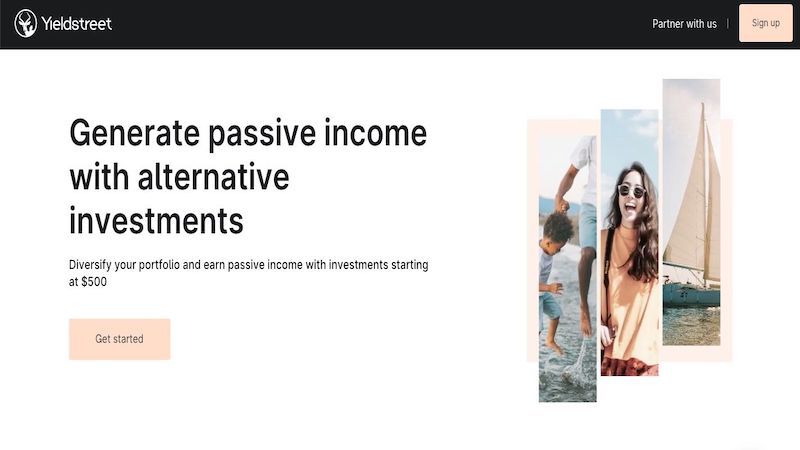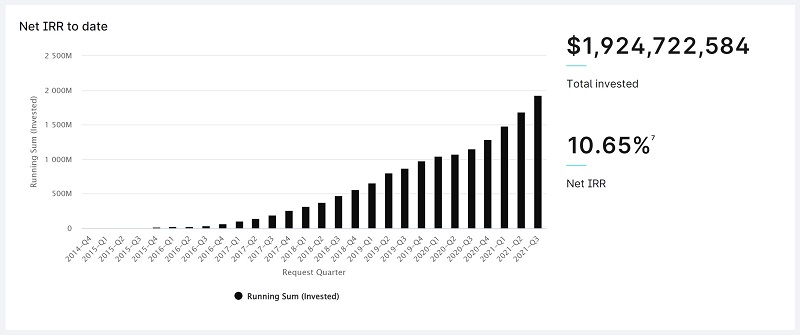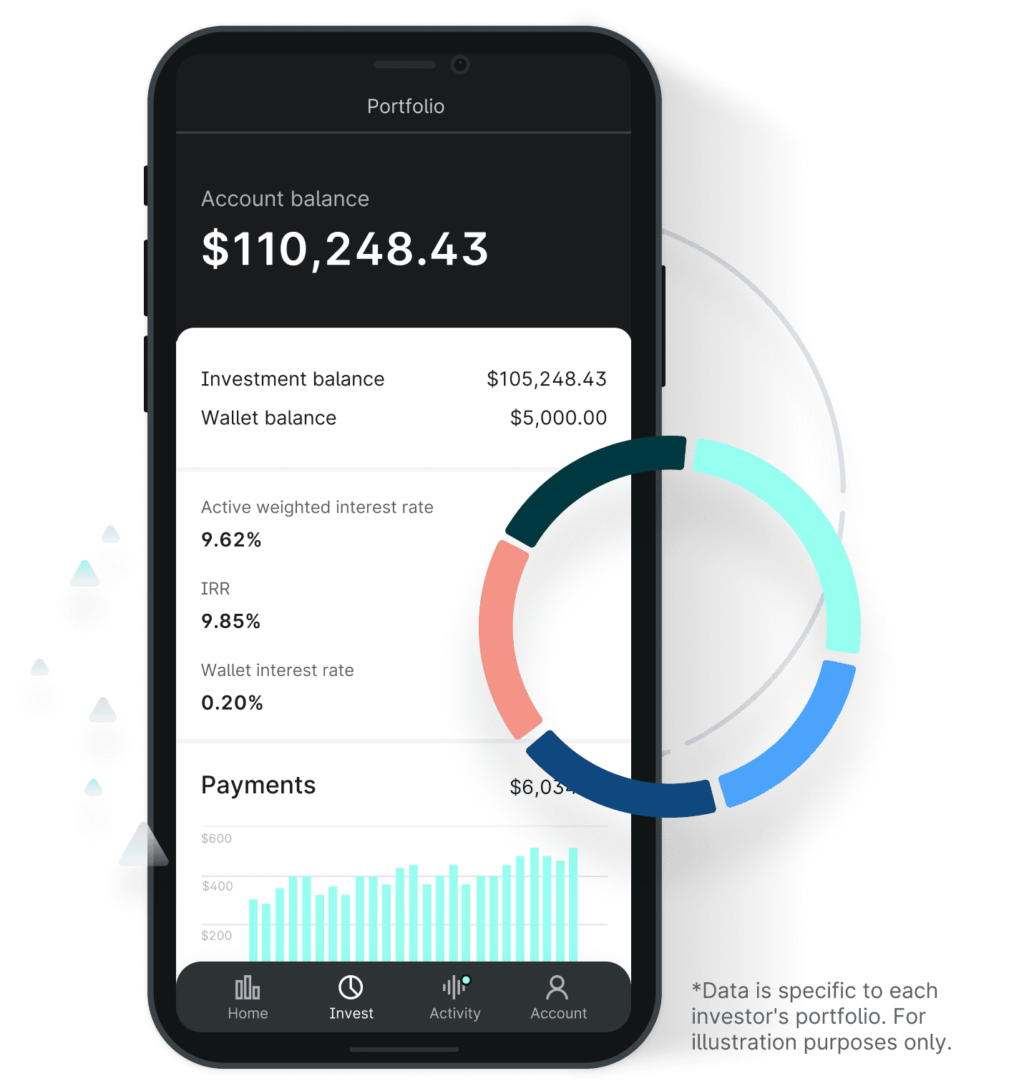Yieldstreet Review: Pros, Cons and How it Works
Some products in this article are from our partners. Read our Advertiser Discloser.
Are you looking for unique passive income ideas besides the stock market?
One option is to invest in physical assets including real estate, artwork and marine vessels. The investment performance for these assets doesn’t consistently move in the same direction as stocks.
Still, it can be challenging to invest in these unconventional assets as an individual investor.
However, Yieldstreet makes it easy to buy alternative investments that were once only available to the rich.
These alternative assets can earn annual returns of at least 8%. Even when the stock market is producing negative returns, Yieldstreet’s offering may earn a positive yield.

Overall Rating
Summary
Yieldstreet makes it easy for accredited investors to earn passive income from alternative assets. This option can be an affordable way to invest in real estate, marine vessels, legal or commercial loans with a low minimum investment.
-
Competitive
4.5
-
Ease of use
4.5
-
Offerings
3.5
Pros
- Competitive investment costs
- Easy to use
- Multiple asset options
Cons
- Accredited investors only
- A limited number of offerings
- 5 yr commitment
How Does Yieldstreet Work?

Yieldstreet offers easy access for accredited investors to alternative investments. These investments are traditionally difficult to access and have high investment minimums.
Most Yieldstreet offerings have a minimum $10,000 initial investment. However, some investments may start at $1,000.
While it’s not “cheap” to invest with Yieldstreet, you’re investing in multi-million dollar projects.
Yieldstreet helps you invest in these assets:
- Single-family rental homes
- Marine vessel acquisition and deconstruction
- Art portfolios
- Commercial property refinancing
- Short-term small business financing
The easing of crowdfund investing rules in 2012 and technology advances make it possible to invest in non-liquid physical assets. You lend money to borrowers and can earn returns that exceed the average stock market or bank account returns.
Most assets require an investment commitment between six months and five years. You won’t be able to “buy today and sell tomorrow” like stocks.
In exchange for the medium-term investment commitments, you can earn potentially higher annual returns than the stock market.
Most Yieldstreet offerings have a target annual interest rate between 8% and 13%.
In contrast, the historical S&P 500 annual return is approximately 7%.

Who Can Invest On Yieldstreet?
Only accredited investors can invest in single offerings whereas there are other products available for all investors.
You can qualify as an accredited investor with a $200,000 annual income ($300,000 for couples) for two consecutive years. Having a $1 million net worth (excluding your primary residence) is another qualifying reason.
You will need to show proof of income or your net worth to start investing with Yieldstreet.
Non-accredited investors can still invest in alternative assets. Fundrise is one of the best platforms as you can invest in commercial and multi-family properties.
The minimum investment is only $500, which is more affordable for most investors.
Yieldstreet states they are developing options available to non-accredited investors. One available product is the Yieldstreet Wallet online savings account.
Account Options
Yieldstreet offers taxable and retirement investment accounts. It’s possible to invest as a trust or LLC. You may also invest with a Solo 401k if it’s set up as a trust or an LLC.

Yieldstreet IRA
The Yieldstreet IRA is another option to invest with a tax-advantage account. You can have a self-directed traditional or Roth IRA.
It takes approximately three weeks to open your Yieldstreet IRA. You will also need to open a free Yieldstreet Wallet account to fund your IRA.
This Wallet account is similar to an online broker’s money sweep account. Your Wallet cash balance earns a small interest rate as you wait to invest in upcoming offerings.
The Yieldstreet IRA has annual management costs similar to other self-directed IRAs. Your fee is $299 when you make less than $100,000 in deposits during the calendar year.
You pay $399 per year if you deposit at least $100,000 and $250,000 in a year.
However, Yieldstreet is waiving the $399 fee for 2020 if you deposit at least $250,000.
Due Diligence
It’s natural to wonder if Yieldstreet is legit if you’re trying to invest wisely.
Yieldstreet screens offerings using a five-point investment philosophy:
- Originations from experienced asset managers
- Low investment minimums
- Short duration (i.e., between six months and five years)
- Target yields of 8% or more
- Low stock market correlation
Yieldstreet rejects approximately 90% of loan applications because they do not meet the five basic tenets.
As of February 29, 2020, Yieldstreet reports 14 defaulted offerings they are actively working out. Another four defaulted loans have been fully resolved.
Yieldstreet has had over 170 total offerings since 2015. Most Yieldstreet offerings are successful but carry risk.
Because Yieldstreet invests in physical assets, each offering has collateral backing. Similar to investing in bonds, Yieldstreet can use the collateral to minimize potential losses from default.
Investment Offerings
What makes Yieldstreet different from other crowdfunding platforms is their diverse investment options.
Most platforms focus on a single asset class like real estate or business loans.
You can invest in these asset classes:
- Real estate
- Legal
- Marine
- Commercial
- Art
- Yieldstreet funds
Although it’s a physical asset, Yieldstreet doesn’t let you invest in gold. Few precious metals investments pay a steady passive income stream.
The number of available offerings fluctuates. There are two offerings available at the time of this review (April 6, 2020). But there can be more, less or none.
The limited availability may be frustrating, but it’s how Yieldstreet practices due diligence. It’s never fun to lose money, especially when you invest in alternative assets.
Individual Offerings

Most of Yieldstreet’s offerings are for individual offerings. Many require a minimum $10,000 investment with $5,000 subsequent increments with their Short Term Notes only having $1,000.
This minimum is competitive with most platforms that are exclusively for accredited investors.
You can also invest in Yieldstreet funds with $5,000 to pre-fund upcoming Yieldstreet offerings. Then, once other investors fund the offering, you get your money back plus interest earnings.
Of course, you can expend more–such as investing $100,000–into high-conviction offerings.
Each offering states the minimum investment commitment. Also, you won’t be able to sell your position until the project completes.
As you’re investing in private assets, there isn’t a secondary market of potential buyers to sell to.
Each offering listing includes these key stats to guide your research:
- Target annual interest
- Investment term
- Dividend payment schedule
- Fees
- Tax structure
- Potential risks
You can also read the investment documents that are similar to a stock fund prospectus.
Here’s a brief overview of each asset class and examples of recent offerings:
Real Estate
Investment properties are a time-tested way to build wealth. Many investors don’t have the time to actively manage investment properties. Yieldstreet lets you earn passive income by investing in real estate.
You will see offerings for residential, student housing, commercial and industrial real estate. Also, the minimum investment is only $10,000 per offering. It’s easy to invest in multiple deals to diversify your portfolio instantly.
Some offerings are for individual properties with multiple tenants. For example, there is a 99-unit multifamily property in Washington, D.C. Also, there is hotel construction in New York City near Times Square.
Some portfolios have multiple properties. One available offering in April of 2020 is 192 single-family rental homes in Florida. These properties are spread across the state in 47 communities with four different builders.
Consider this: Fundrise lets you invest in a managed portfolio with national exposure.
Legal
Legal offerings are an interesting investment you won’t see on many platforms. Some recent legal offerings let you invest in pre-settlement advances for personal injury cases.
You earn income as cases settle and collect a portion of the settlement.
Legal portfolios don’t have physical collateral. However, Yieldstreet manages risk by placing cases that are more likely to settle with those that are less likely. This “cross-collateralization” reduces your risk of loan default.
Commercial
The commercial offerings let you invest in short-term business loans.
One recent offering is for merchant cash advances with a target annual interest rate of 13%. With this loan type, you lend money upfront to businesses. You earn interest income from future sales volumes.
Other offerings let Yieldstreet pre-fund upcoming investments. These offerings may only earn a target interest rate of 6%.
However, they have a short investment commitment of up to six months. So you can earn a higher yield than by building a CD ladder, for instance.
Similar to the legal offerings, Yieldstreet places different businesses into the portfolio to reduce downside risk.
Marine
You can invest in the construction of shipping vessels. Without Yieldstreet, you have to invest in shipbuilders or shipping companies on Wall Street.
A unique way to make money selling scrap money is by investing in the deconstruction of vessels. Your investment funds the deconstruction and recycling of the metal and other materials.
One potential risk for marine loans is the need to invest additional funds because of cost overruns. You must invest more if the ship deconstruction costs exceed 120% of the scrap metal value, for instance.
Art
Another popular alternative asset idea is investing in artwork. This option can be a good one if you’re familiar with the art market. Some genres fare better during economic downturns than others.
One recent offering was for ten Impressionist and Modernist paintings. The offering has a 10.25% annual target return with a 21-month investment term.
A second offering is for a collection of Post-War and Contemporary Art. The target yield is 10.25% with an 11-month term.
Yieldstreet Prism Fund
If you’re not sure where to invest your cash, consider the Yieldstreet Prism Fund. This fund spreads your money across a variety of asset classes. You get exposure to classes like real estate, commercial and legal.
The investment minimum is $5,000, which is higher than the standard minimum.
The Prism Fund has an annual 7% target yield with quarterly dividend payments. And you can choose to reinvest your dividends.
This 7% annual target yield is lower than investing in hand-picked Yieldstreet projects.
However, you may have less downside because you invest in a fund with multiple holdings. The yield is similar to the historical S&P 500 annual return without investing in stocks.
The investment commitment is 48 months. But you may be able to make partial redemptions each quarter after the first 15 months.
Even so, investing in individual offerings requires you to hold until the project completes.
Some of the potential fixed income options include:
- International corporate debt
- Municipal bonds
- Emerging markets debt
- Foreign currency and interest rates
- Asset-backed securities
Note that investors in Nebraska, North Dakota and Texas cannot invest in the Prism Fund at this time. Be that as it may, at least the individual Yieldstreet offerings are available in all 50 states.
The Prism Fund will charge these recurring fees:
- Annual management fee: 1.0%
- Annual administrative expense: Up to 0.50%
- Estimated annual leverage fee: 0.25%
These fees are similar to what Fundrise charges for their managed portfolios.
Investment Fees
The investment fees vary by individual offering. You will see the fee structure in each offering summary. Each one lists the first year fee and the annual flat fee.
One standard fee is the annual Yieldstreet management fee of 1%. To clarify, you pay $100 on a $10,000 investment for the first year with a 1% fee. Also, some projects have a 2% annual fee. Still, this yearly fee is competitive with most crowdfunded real estate platforms.
The additional annual flat fee is a secondary charge to cover filing fees and legal costs. This fee varies on the offering. Yieldstreet uses your first dividend payments to pay these fees.
Receiving Distributions
Most offerings pay dividend income quarterly. However, some may issue monthly or yearly distributions. You will see the dividend schedule in the offering listing.
Each offering’s “How do I get paid?” section also lists when you get your original investment back. In most cases, that’s at the end of the target completion date Yieldstreet lists during the funding round.
Some projects have an option to extend the completion date. For example, Yieldstreet may offer a one-time extension of 12 months. You have to wait longer to access your cash, but you keep earning passive income. The extension details are in the offering paperwork.
Borrowers may also pay off the loan early and usually without a prepayment penalty. You earn less total income from that offering. But you can invest in a new offering sooner.
Early Redemptions
Yieldstreet doesn’t offer early redemptions for any offering. To be sure, the lack of early redemptions is a large downside for investing in illiquid assets.
But the tradeoff is avoiding the day-to-day volatility of the stock market. Plus, you have the potential of earning higher investment returns.
However, if you need to cancel or modify your investment, you can contact Yieldstreet. The company states that they will try to help.
Tax Treatment
You may base your investing decisions on which tax form you receive. Yieldstreet will either report your taxable gains on Form 1099-INT or the dreadful Schedule K-1.
Most offerings issue a 1099-INT because of their tax structure. This is good news as the investment minimum is lower for these offerings, and federal rules allow more investors to buy a stake.
Offerings producing a Schedule K-1 can only have up to 99 investors at one time.
Which tax form you receive depends on the investment structure.
Borrower Payment Dependent Notes (BPDN)
A borrower payment dependent notes (BPDN) investment structure issues a 1099-INT. This structure is more like a “debt” structure deal where Yieldstreet lends money to the borrower. Your interest income can depend on the offering’s investment performance.
BPDN structures tend to have lower investment minimums. These offerings are more likely to have a $10,000 investment minimum, for instance.
Special Purpose Vehicle (SPV)
You will receive a Schedule K-1 at tax time with a special purpose vehicle (SPV) structure. With an SPV structure, you’re becoming a “business partner”.
For this reason, Yieldstreet forms an LLC to manage the offering in this deal structure.
Current regulations only allow up to 99 investors to participate in SPV deals. The minimum investment can be higher as a result.
In addition to earning a fixed income rate, the interest income you earn is proportional to the size of your ownership stake. A 10% ownership stake means you receive 10% of the investment income.
Yieldstreet Wallet
Yieldstreet Wallet is a FDIC-insured savings account for accredited and non-accredited investors. There are no fees.
However, this account yields a paltry 0.001% APY on all deposits. Thus, you should store your spare cash in a high-yield savings account instead.
Most investors should use their Wallet account to hold cash if they plan on investing in a Yieldstreet offering soon. In fact, you need a Wallet account if you open a Yieldstreet IRA.
Having your cash in a Yieldstreet Wallet account lets you fund an offering quickly. Investing directly from your Wallet account enables you to avoid the normal one or two-day bank transfer times.
Yieldstreet doesn’t enforce a minimum or maximum balance. Your funds have FDIC insurance up to $250,000 per account. Also, you can make up to six monthly withdrawals.
Is Yieldstreet Safe?
Yieldstreet is registered with the Securities and Exchange Commission (SEC). It is a legit way for you to earn passive income with real estate. Audit reports from a third-party agency are available yearly.
The investment performance for the asset classes doesn’t mirror what the stock market does. The low correlation makes it possible to earn income even during a stock bear market.
However, Yieldstreet isn’t risk-free. You can lose money if the borrower defaults. Still, most assets have physical collateral that Yieldstreet can use to offset investment losses.
Other macroeconomic factors can impact investment performance. For example, declining scrap metal prices can affect marine vessel deconstruction. Lower scrap prices signal a lower potential return.
Also, Yieldstreet may extend the repayment period to complete the projects. You continue to earn investment income. However, you must wait even longer to access your capital.
What happens if Yieldstreet goes bankrupt?
Another possibility is if Yieldstreet goes bankrupt or closes. If this happens, another manager will resume control of your outstanding investments.
While there might be short-term uncertainty, you still hold a stake in the physical assets.
You can expect to continue earning interest payments from the new manager. They will redeem your investment principal once the offering completes.
Positives and Negatives
Pros
- Invest in multiple alternative asset classes
- Average annual target returns between 8% and 13%
- Collateral-backed assets reduce downside risk
- Competitive investment costs
- Extensive due diligence
Cons
- Only open to accredited investors
- A limited number of open offerings
- Assets are illiquid
- Up to five-year investment commitment
- Risk of loan default
Summary
Yieldstreet is a creative way for accredited investors to invest in alternative assets like crowdfunded real estate.
You can earn passive income without relying on the stock market. However, as with any investment, do your due diligence before buying.

